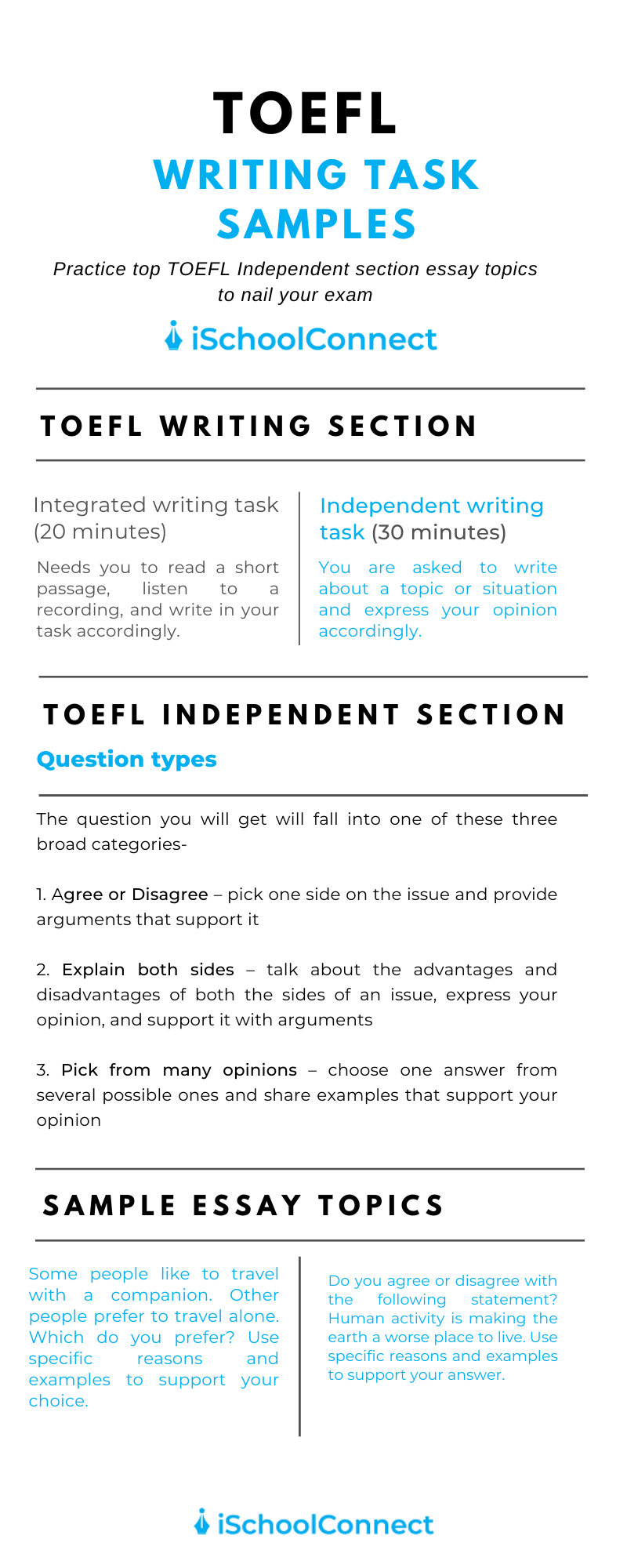Table of Contents
A lot of students find the Reading, Listening, and Speaking sections of the TOEFL (Test of English as a Foreign Language) exam fairly easy. It’s the TOEFL Writing section that gives everybody a run for the woods. To reduce your nervousness and help you prepare for the TOEFL Writing section, I have included in-depth details about each question and shared tips on how to nail it. Along with that, you will also find 8 TOEFL essay topics to help you get started. So, what are you waiting for? Dive in!
What is the TOEFL Writing Section?
The fourth and the last section of the TOEFL exam, the Writing Section measures your ability to write in English at a university level. Its aim is to test how you structure your thoughts and see if you can present them clearly (without any grammatical mistakes).
The Writing Section of TOEFL takes 50 minutes to complete and comprises of 2 questions-
- Independent Writing task, which takes 30 minutes
- Integrated Writing task, which takes 20 minutes
While the Independent task tests your ability to organize your thoughts and express them, the Integrated task focuses on how well you can use English in class.
Let’s take a look at them one by one.
Part 1: The Independent Writing task
For this task, you will be asked a question on a personal topic or an issue. Depending on what the question is, you will either have to share a personal experience or give your opinion on the topic. In case it’s an issue-based topic, you will also have to give reasons and examples that support your opinion.
The question you will get will fall into one of these three broad categories-
- Agree or Disagree – pick one side on the issue and provide arguments that support it
- Explain both sides – talk about the advantages and disadvantages of both the sides of an issue, express your opinion, and support it with arguments
- Pick from many opinions – choose one answer from several possible ones and share examples that support your opinion
The first two appear more commonly in exams than the third.
But no matter what the question or the question type, I have a one-stop solution for you (so excited to share this)!
5 authentic tips on how to ace the TOEFL Independent Writing question
1) Let’s dive straight into it – the first thing you need to do is structure your essay. And this is something you can (and should) do even before the exam begins.
2) Choose to have a limited number of paras. Start by stating the topic and your opinion, use the second and the third paragraphs to support your opinion with 2 strong points. Use examples to support these points if needed.
3) In the fourth paragraph, acknowledge that your opinion is not perfect (because it’s an opinion and not fact) and talk about the strengths of the opinion you did not pick.
4) Use the fifth paragraph to say that even though the other side has its own advantages, you prefer yours. This is a good place to add a third point in favor of your own argument.
5) Conclude with the sixth paragraph by tying up everything you have said so far and restate your opinion.
There! The perfect structure to nail your TOEFL Independent Writing task.
A few things to keep in mind-
- Do not limit your essay to 300 words, try to reach 600-700 words if possible
- Spend the first 2 minutes to come up with 3 strong points to support your argument
- In case you don’t get enough time, skip the suggestion for the third paragraph and save yourself a few minutes
- Finish writing your essay in 25 minutes and spend the last 5 minutes checking for any grammatical errors

Sample TOEFL essay topics
Now that you know how to go about the Independent Writing task and have also looked at a sample answer, it’s time to practice with some TOEFL Writing samples!
I’m sharing a few TOEFL essay topics given by ETS (the official TOEFL test-takers) for you to choose from-
- Do you agree or disagree with the following statement? When people succeed, it is entirely because of hard work. Luck has nothing to do with their success. Use specific reasons and examples to explain your position.
- Do you agree or disagree with the following statement? Human activity is making the earth a worse place to live. Use specific reasons and examples to support your answer.
- When you face a difficult problem in life, what do you feel is the best way to solve it?
-asking someone with more experience for advice about the problem
-finding information about the problem using the Internet
-taking a long time to think about the problem
Use specific details and examples in your answer. Do not use memorized examples. - Some people like to travel with a companion. Other people prefer to travel alone. Which do you prefer? Use specific reasons and examples to support your choice.
- It is important to improve our skills and knowledge as much as possible. Some people prefer to learn from individuals who have more experience than they do – like teachers and supervisors – instead of learning from peers, like their colleagues and classmates. Do you think this is a good idea? Why or why not?
- Television advertising directed toward young children (aged two to five) should not be allowed.
- Do you agree or disagree with the following statement? ‘A teacher’s ability to relate well with students is more important than excellent knowledge of the subject being taught.’ Use specific reasons and examples to support your answer.
Part 2: The Integrated Writing task
For this task, you will have to read a short passage, listen to a 2-minute lecture about the same topic, and write a response to what you read and listened to.
The question tests your listening, reading, and writing chops and evaluates how you would do in a real classroom. So, answer it in a way that includes the content of both the passage and the audio recording.
Here, you do not need to provide an opinion. You just have to summarize what you learned from the essay and the recording. And while you will have the passage in front of you as you write the answer, you will not be able to listen to the audio recording again. But this should not affect you in any way. Let’s see why.
How to nail the TOEFL Integrated Writing question
The ideal way to solve this problem is to take notes. Start by reading the passage, slowly. Since it’s a short passage, the amount of time allotted will be more than enough. As you read each para, write down one sentence (of 4-5 words) describing what you learned from that paragraph. Do this for the entire passage.
When you’re listening to the audio, again make notes. Write down the primary points leading the argument in the recording.

When it’s time to start writing, take a few seconds. Collate all your points and structure your answer.
Split it into 4 paragraphs. Use the first para to state the topic, and the second one to talk about what the passage states. In the third paragraph, use points from the audio recording. And conclude with a sentence or two in the fourth para.
That’s it – you’ll have close to 250 to 300 words and you’ll have presented a clear, concise answer!
A few things to keep in mind-
- Find what works for you – writing more notes, or less
- To save time while making notes, don’t write sentences but one-worded points
- Finish writing your essay in 15 minutes and spend the last 5 minutes checking for any grammatical errors
Integrated Writing TOEFL essay topics
Here are TOEFL essay topics I borrowed from ETS, the official TOEFL test-takers-
Directions
Give yourself 3 minutes to read the passage.
Reading Time: 3 minutes
In an effort to encourage ecologically sustainable forestry practices, an international organization started issuing certifications to wood companies that meet high ecological standards by conserving resources and recycling materials. Companies that receive this certification can attract customers by advertising their products as “ecocertified.” Around the world, many wood companies have adopted new, ecologically friendly practices in order to receive ecocertification. However, it is unlikely that wood companies in the United States will do the same, for several reasons.
First, American consumers are exposed to so much advertising that they would not value or even pay attention to the ecocertification label. Because so many mediocre products are labeled “new” or “improved,” American consumers do not place much trust in advertising claims in general.
Second, ecocertified wood will be more expensive than uncertified wood because in order to earn ecocertification, a wood company must pay to have its business examined by a certification agency. This additional cost gets passed on to consumers. American consumers tend to be strongly motivated by price, and therefore they are likely to choose cheaper uncertified wood products. Accordingly, American wood companies will prefer to keep their prices low rather than obtain ecocertification.
Third, although some people claim that it always makes good business sense for American companies to keep up with the developments in the rest of the world, this argument is not convincing. Pursuing certification would make sense for American wood companies only if they marketed most of their products abroad. But that is not the caseAmerican wood businesses sell most of their products in the United States, catering to a very large customer base that is satisfied with the merchandise.
Directions
Read the transcript.
Narrator: Now listen to part of a lecture on the topic you just read about.
Professor Well, despite what many people say, there’s good reason to think that many American wood companies will eventually seek ecocertification for their wood products. First off, consumers in the United States don’t treat all advertising the same. They distinguish between advertising claims that companies make about their own products and claims made by independent certification agencies. Americans have a lot of confidence in independent consumer agencies. Thus, ecologically minded Americans are likely to react very favorably to wood products ecologically certified by an independent organization with an international reputation for trustworthiness.
Second pointof course it’s true that American consumers care a lot about pricewho doesn’t? But studies of how consumers make decisions show that price alone determines consumers’ decisions only when the price of one competing product is much higher or lower than another. When the price difference between two products is smallsay, less than five percent, as is the case with certified wood Americans often do choose on factors other than price. And Americans are becoming increasingly convinced of the value of preserving and protecting the environment.
And third, U.S. wood companies should definitely pay attention to what’s going on in the wood business internationally, not because of foreign consumers, but because of foreign competition. As I just told you, there’s a good chance that many American consumers will be interested in ecocertified products. And guess what, if American companies are slow capturing those customers, you can be sure that foreign companies will soon start crowding into the American market, offering ecocertified wood that domestic companies don’t.
Directions
Give yourself 20 minutes to plan and write your response. Your response is judged on the quality of the writing and on how well it presents the points in the lecture and their relationship to the reading passage. Typically, an effective response will be 150 to 225 words. You may view the reading passage while you respond.
Response time: 20 minutes
Question: Summarize the points made in the lecture, being sure to explain how they cast doubt on specific points made in the reading passage.
Any last-minute tips?
Yes, just two-
- Remember that there’s no spell-checking tool that will help you during the test. So, when you’re practicing and preparing for the writing section, disable Grammarly or the spell-check tool in Word (depending on where you’re practicing).
- Don’t lose your cool. If you see a question that might be difficult to answer or notice a grammatical error just as the timer is going off, don’t panic. Take a deep breath, rethink your writing plan, and get back to the test. Worrying won’t help.
A bonus tip is this – practice, practice, practice. It will help you stay prepared for whatever question may come your way.
And if you need any help, you know where to find me! Drop a comment and let me know what I can do to help with your TOEFL essay topics. I would be more than happy to help.
All the best for your exam!







Nice article. Very helpful for students who are preparing for TOEFL . Good work. Keep it up.
Thank you
Nice article, this will help test takers a lot, keep it up